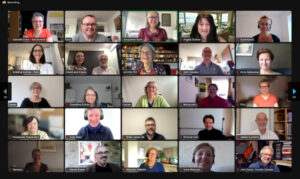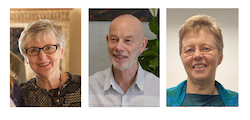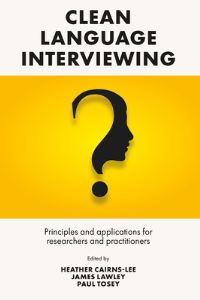Question:
– Spiritual – Transpersonal – Enlightened – Zen mind – Nondual
All of these in some way include going beyond the self or accessing a no-self state. Each client enjoyed the experience and felt they accessed some out-of-the-ordinary states. My take is that to varying degrees they touched ‘the transpersonal’ but had limited success in accessing states of complete no-self. (Of course I don’t really know what I am looking for so I might have missed the signs!) That doesn’t mean it’s not possible. It means we either haven’t figured out how to do it and/or the people doing the accessing were not ready.I like Ken Wilber’s idea that there are several types of transpersonal experience.1 And his notion of the ‘pre-trans fallacy’ makes a lot of sense to me. He suggests that in the broadest sense there are three stages/levels of development: pre-personal; personal; and transpersonal. Wilber claims that many people make two mistakes:
They confuse the surface similarities of the pre-personal and transpersonal states. They think they are accessing transpersonal states when they are actually accessing pre-self states – much to the dismay of everyone around them.
People who have not yet developed a strong enough sense of self should not attempt to go directly for transpersonal states by skipping the personal stage. Not only are they unlikely to succeed, but if they do, they may then have difficulty navigating the everyday physical reality we live in. Wilber puts it nicely: Before we can transcend and include the self we have to have a stable self to transcend and include.
Of course my explanations are riddled with contradictions, but that’s the nature of this stuff. For a start, the whole notion of having a desired outcome to access a state that doesn’t include a self that can have desires is comical. However, there is no discovery without experimenting
We have approached the topic in a number of ways:
Re-accessing past states. Most people have had momentary mystical experiences that Maslow called “peak states” and Wilber “one taste” – a complete fullness or sense of oneness with everything that exists both in the inner and the outer worlds.2 Can they re-experience these states and become more aware of how to do that?
Going directly for the desired no-self state. People who wanted to do this already had a conceptual sense of this kind of state. Can they access what they think the state is, even if they have never experienced it before? (The problem here is if they have never had the state, their concept of what it is will be limited by their current level of development – and it’s a place to start.)
- Identifying ‘the self’ and attempting to go beyond that (or, as Christopher Townsend put it, to ‘deconstruct’ the self). This has produced some fascinating sessions because the contradiction of the self consciously giving up its role (sometimes referred to as committing ego suicide) becomes evident during the session.
I’ll now add something about my experience of facilitating these states. First the usual calibrations3 don’t necessarily apply and so for me it was very much attempting to feel my way. The blind leading the blind would be an apt metaphor. Also at some stage the client would keep repeating the same few words or stop speaking entirely. Then I had to rely almost exclusive on nonverbal cues, and knowing when to ask the next question was a real stretch.
Example transcript
Below is an extract from transcript where I (J) was facilitating a client (C, who was a coach) who spontaneously accessed a “higher consciousness”:4
| C: | There’s no need to think. Everything’s just there. All the resources are just available. [Big gesture with arms held wide] There’s no need for [inaudible]. |
| J. | So they’re all available. So when those resources are all available, and it just flows, and there’s peace, and a sharing, and a higher conscious self with a higher intention, what would that higher conscious self like to have happen? |
| C: | A perfect outcome for the client. |
| F. | So then what happens, when that higher conscious self wants that perfect outcome for the client? |
| C: | Can you repeat the question? |
| J. | So when the higher conscious self wants the perfect outcome for the client, then what happens? |
| C: | It’s like things morphing together. It’s coming together. Everything’s coming into one [gestures in front]. It’s very difficult to explain. It’s like everything’s just coming into one. All parts coming together. |
| J. | So as those parts, all those parts come together as one, what kind of one is that – that they are coming together as? |
| C: | It’s just perfection. It’s perfection. |
| J. | And is there anything else about this [gesture to the space in front of the client] that they’re all coming together as? |
| C: | It’s all part of one. I seem to be repeating myself. It’s all part of one. It’s all part of the whole. It’s all part of the whole. It is everything together all rolled into one. Part of the universe. |
| J. | And when it’s all part of the one, part of the whole, part of the universe, then what happens to in and out? |
| C: | It’s not there. It’s all part of the [gestures in front]. It’s part of everything. |
By the way, it is common for a client who accesses this kind of state to say, as this client did, “Can you repeat the question?”. My take is that at this point the client is so ‘in it’ that my question has disappeared from his short-term memory. At some point (which can seem like a very long time to the facilitator but usually not to the client since they temporarily lose their sense of time passing), the client ‘pops out’ and realises they’ve forgotten the question.
Interestingly, the same kind of thing can happen when a client is invited to reassess a previously unquestioned assumption that is central to maintaining a pattern of behaviour. For example, the following exchange is common with a client who has stated that what they want can’t or isn’t going to happen:
Fac And when you can’t have what you want, what would you like to have happen?
Client: I want to have what I want.
Fac: And you want to have what you want. And you can’t have what you want. And what would you like to have happen, when you can’t have what you want?
Client: I er, … I er, … [long pause] what was your question?
I don’t know if this can be classes as a ‘transpersonal’ state but it sure is a ‘transcendent’ state, out of which all manner of new perspectives can arise.
Three Clean approaches
And there are other clean ways of accessing these kind of states. For instance:
Intergenerational Healing. David Grove’s process from the early 1990s that repeatedly pulls back time to an original source or “redemptive metaphor” (And where does that come from?).5
Clean Worlds. David Grove’s process from the early 2000s invites clients to explore larger and larger contexts, (prior) world views or “cosmologies”. (And what’s outside/beyond that?)
Truth Work. Steve Saunders’ iterative processes that uses the ideas of David Grove’s Emergent Knowledge to access core beliefs and to facilitate a person to see the “cosmic joke” (What needs to be true for that to be true?).6
It seems we are just at the beginning of learning how a Clean approach can support people to access transpersonal states.
Notes
1 A detailed review of Ken Wilber’s ideas on identity development and their relevance to a clean approach can be found in Robert Smith’s ‘Identity Change with Grovian Metaphor’: cleanlanguage.co.uk/articles/articles/72/
2 Wilber, Ken. One Taste: The Journals of Ken Wilber. Boston: Shambala, 1999.
3 See Penny Tompkins and my Calibrating whether what you are doing is working or not.
4 You can see an unedited video of the demonstration at vimeo.com/22733484 and download an annotated transcript of the full session from xxxxx
5 See David Grove’s Problem resolution through metaphor therapy








